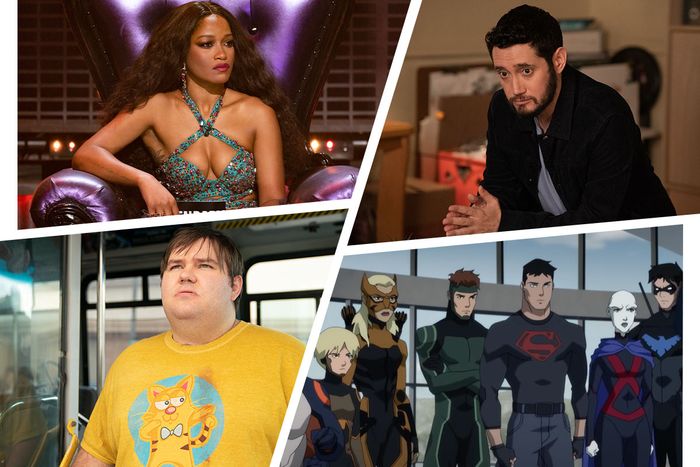
The TV landscape, for all its excess, has been decimated by corporate greed this year; beloved scripted series, animated favorites, and cult reality competitions are all amongst the wreckage. As we close out a difficult year, Vulture staffers pay tribute to the ones gone too soon.
FBoy Island (HBO Max)
The best reality TV is in on the joke, and FBoy Island understood this perfectly. Half the cast was precisely the type of reality-TV contestant we love to laugh at: fuckboys, most of them self-proclaimed. The show made it easy to laugh at them too, with help from host Nikki Glaser (whose career seemed to be building to this gig) and the women fending off these men. Reality TV also asks us to take the silly things seriously, and FBoy Island made that easy too, prompting arguments about who was a fuckboy and who was a nice guy — or, worse, defenses of the fuckboys who captured our hearts. Throw in a few well-timed twists and some moments of self-discovery, and you have a winning formula, one that could’ve excelled for many more seasons (and still could, if STXalternative is able to sell the show elsewhere). Like CJ eliminating Casey, we were far from ready to say F-Bye. — Justin Curto
Dan Brown’s The Lost Symbol (Peacock)
Plenty of great, smart shows fell to the mercy of streaming’s shifting landscape and corporate tax write-offs (??) this year. I’m sure my esteemed co-workers will tell you about them. Personally, I’m mourning the loss of one of the most gloriously stupid shows I’ve ever seen: Peacock’s Dan Brown’s The Lost Symbol. As its incredibly clunky title wants to make sure you know, Dan Brown’s The Lost Symbol is based on Dan Brown’s best-selling Robert Langdon books (of The Da Vinci Code fame). The Lost Symbol is the third book in the series, but the TV show turns it into a prequel, with Succession’s Ashley Zukerman running around Washington, D.C. being smarter than everyone by shouting absolute gobbledygook about symbols and ciphers and ancient mysteries. Eddie Izzard’s hand gets cut off! A man with full-body tattoos drinks a fancy little tea! A grieving mother eats her son’s baby teeth! (?????) Everything that happens makes absolutely no sense but is presented so confidently you can’t help but be charmed. I will miss this ridiculous show so, so much. Here’s hoping Disney+’s National Treasure: Edge of History can fill the void. — Emily Palmer Heller
The Wilds (Prime Video)
Picture it: You’re watching a show that is a combination of Lost, Lord of the Flies, and The Hunger Games. The teenage to mid-20s cast is full of rising stars and their acting trumps whatever’s going on in most teen shows. It uses all the devices that make for good TV: Each episode focuses on a new character and perspective; queer characters exist and grow and do not die in the pilot; there is mystery, death, intrigue, and a few pop-culture references sprinkled throughout; the first two seasons end on the ultimate cliffhangers. Sounds good, right?! Well, TOO BAD, because it’s gone. The Wilds, a survivalist YA drama about teenagers unwillingly participating in a social experiment, dropped on Amazon Prime in December 2020 and sort of set the stage for Showtime’s Yellowjackets to become a massive hit less than a year later. Because of the YA nature of the show, The Wild’s fandom grew by word of mouth, and by the time season two premiered in May of 2022, it felt like the show had real potential to stick a conclusive landing. Season three was already mapped out, but then Amazon Prime pulled the plug, presumably to invest more in fantasy (Wheel of Time, Lord of the Rings: The Rings of Power), and less in shows about teenage girls — a twist I personally don’t love! — Morgan Baila
Flatbush Misdemeanors (Showtime)
Flatbush Misdemeanors was smart television that felt entirely of this moment. Sharp scripts from co-creators Kevin Iso and Dan Perlman and their writers’ room layered incisive critiques of gentrification and “woke” politics with intentional character development. The clever episodic structure used intertitles to slice each half-hour into vignettes following the standout ensemble as they moved around their Brooklyn neighborhood and got entangled in each other’s lives. Hassan Johnson and Kristin Dodson brought an easy charm to their performances, the latter precisely vacillating between the self-indulgent confidence of adolescence and the quiet fragility of a young woman trying to make her own way. I wrote in my “Best TV of 2022” blurb that “This is a series about the effort needed to maintain the relationships that mean the most to us but that we might take for granted. Whether we appreciated Flatbush Misdemeanors enough for the lesson it tried to teach us before its cancellation is a question with a poetically ironic answer.” Congratulations to Yellowjackets for securing a third-season renewal on Showtime before its second season even aired, but it would’ve been nice for the network to have that kind of confidence in Flatbush Misdemeanors, too. The series deserved it. — Roxana Hadadi
Rutherford Falls (Peacock)
Rutherford Falls had all the ingredients of a celebrated Michael Schur sitcom: a commitment to strong joke-writing, valiant attempts to grapple with questions that are ultimately too complex for a feel-good sitcom, and a warm ensemble of characters with quirky traits that took roughly one and a half seasons to calibrate. By the end of season two, Schur and the show’s other creators, Sierra Teller Ornelas and Ed Helms, had effectively figured out how to decenter Helms’s clunky Nathan Rutherford after using his story arc to open up the world of the fictional Minishonka Nation, and there was an endless store of material to be found in the lives and customs of its Indigenous residents. Rutherford Falls had done the hard work of being bloated and didactic early on so that, in season three, it would have had the opportunity to be a powder keg of jokes that start off endearing before becoming annoying fodder for reaction GIFs and dating-app bios. All this aside, I will never forgive Peacock for robbing the world of the opportunity to see the magnetic Bobbie Yang serve out their term as mayor of Rutherford Falls. — Hershal Pandya
Saved by the Bell (Peacock)
The ’90s teen shows that raised me haven’t all aged well, so I was skeptical of another return to Bayside when it was announced. But by taking the original series to task and foregrounding a young, diverse, and exceptionally lovable cast of emerging talent, showrunner Tracey Wigfield took a risk that paid off, creating something wholly original and inclusive from a show about teens whose after-school activities included surfing and filming drug PSAs. So I guess my gripe is with Peacock for making me fall in love with these adorable sophomores and not letting me watch them cross the stage. Just think of all that we lost: the execution of Mack’s grand scheme to make Daisy go to prom with him. Toddman auditioning to replace the fallen Try Guy. Lexi going on Ziwe. It’s not fair!! But listen, my fealty can be bought, and I’ll even tell you the price: green-light Becoming Lexi: I Am Me, and I’m yours. — Anusha Praturu
As We See It (Prime Video)
This Amazon Prime series from Jason Katims approached living on the spectrum from a perspective we don’t often see on television. As We See It was not about parents raising an autistic child or the dynamics of a family in which one person has special needs. It focused on young-adult roommates with autism doing the same things all young adults do: attempting to navigate their jobs, relationships, and anxieties so they can lead productive, happy lives. The three central characters, Jack, Harrison, and Violet, were each played by actors on the spectrum — Rick Glassman, Albert Rutecki, and Sue Ann Pien — who delivered vibrant and authentic performances. Even though it’s technically based on an existing story (the Israeli series On the Spectrum came first), this is precisely the kind of show I worry we won’t see as much in an IP-focused, streamlined streaming world. As We See It was a relatable, fresh, and honest drama about the richness and beauty of simply trying to be a wholly realized human being. — Jen Chaney
Young Justice (HBO Max)
I am in denial that my sweet, beloved Young Justice could be canceled for good, and — officially — the folks at HBO Max are too. (Their email, my bereavement: “It was not canceled as HBO Max had only one season ordered from the get-go. That plan has not changed and there are currently no plans for a fifth season.”) For now, though, it’s gone, and not for the first time. The intricately plotted, defiantly mature DC superhero saga with approximately one thousand speaking roles and a tangled web of deception was canceled nearly a decade ago; the streaming era revived it for a third season on DC Universe (2019) and fourth on HBO Max (2021), and creators Brandon Vietti and Greg Weisman infused the revival with even more storytelling ambition and character study. There’s a lot of plot in the fourth, final installment, subtitled Phantoms, but each episode and arc lasers in more on the psychological problems its heroes and villains face than the action itself. To name just a few: Miss Martian grieves for her husband, Beast Boy can’t shake his depression, Rocket can’t balance time with her son and work on the Justice League, and Halo faces questions of faith and identity as she comes out as nonbinary. Young Justice always dramatized interiority in a medium where the narrative is by necessity external, throwing so many punches and kicks over the years but never forgetting the hearts behind them. Let’s hope the new stewards of DC intellectual property won’t forget them either. — Eric Vilas-Boas
Legendary (HBO Max)
Legendary, the three-season HBO Max reality competition about contests between ballroom houses, was regularly the messiest, funniest, jaw-dropping-est, queerest show on television. Discussing it in those terms makes it sound like homework — Legendary’s three seasons each featured moments in the all-time reality-competition pantheon because they featured some of the best artists in reality-competition history. Season one’s cape snatch, season two’s House of Tisci Andy Warhol performance, and season three’s House of Juicy Couture’s hand performance all stand among the most iconic challenge performances ever aired; the judges were among the best on TV. The loss of Legendary leaves a hole in the television universe. — Jason Frank




